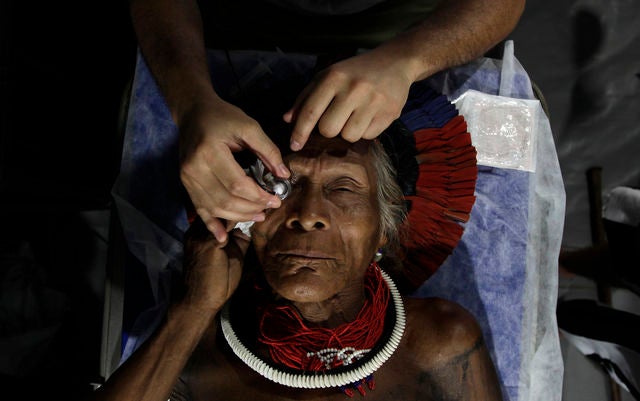Expanding access to care for the world's indigenous: a blueprint for health equity
Global organizations call for increased health care for a population that remains largely underserved
Expanding access to care for the world's indigenous: a blueprint for health equity

The world’s indigenous peoples have lower life expectancy, face a higher risk of diabetes and disabilities, and experience higher rates of diseases ranging from tuberculosis to depression. Their self-determination is threatened by climate change, conflict, natural disasters, and the disposal of toxic waste. And they experience a health inequity that is only made greater by the failure to recognize cultural traditions and a lack of integration into national health systems that are supposed to provide primary care (PHC).
PHC is the comprehensive system to improve health and equity and the overall well-being of people and communities in all stages of life, and accounts for 90 percent of a person’s total health care needs over a lifetime. In the case of indigenous peoples, it is care that continues to elude many of the between 370 million and 500 million people who occupy nearly 22 percent of our planet’s land. This was made evident at the onset of the COVID-19 pandemic, which proved to be a harbinger for the fragility of the world’s health systems and showed that the world’s indigenous and nomadic peoples have very thin safety nets.
According to Jose Francisco Cali Tzay, the UN’s Special Rapporteur on the rights of indigenous peoples, “indigenous peoples were more likely to die of COVID-19, were being hit the hardest by its socioeconomic consequences, and their inadequate access to healthcare increased the likelihood of them catching the virus.” At the same UN Human Rights Council meeting, the Assistant Secretary General for Human Rights, Ilze Brands Kehris, said the pandemic “exposed and exacerbated preexisting structural inequalities and systemic racism,” with the indigenous being disproportionately affected.
Earlier this year, the United Nation’s Permanent Forum on Indigenous Issues called on the World Health Organization to “incorporate indigenous peoples’ cultures into the social determinants of health policies,” adding that the WHO should “review, update and expand its policy on indigenous peoples’ health.”
The threats to the health of the world’s indigenous peoples are not only many – some are also specific to certain geographic regions. In North America, after dozens of cases of missing and murdered indigenous women and girls and the discovery of the remains of more than 160 unidentified indigenous children made headlines, the need for mental health support increased. In New Zealand, where the indigenous Māori have been found to suffer from “inequitably high rates of kidney failure and lower rates of kidney transplant" the need for pre-emptive care procedures has significantly increased. And in South America, where tribes from the Bolivian Amazon lack access to sanitation or running water, mitigating disease brought on by infectious pathogens has become a priority. The World Bank says that, across the board, the world’s indigenous peoples experience “worse access to basic services, and far fewer social and economic opportunities.”
World Bank Senior Social Development Specialist Dianna M. Pizarro noted, however, that even against these odds “many of the world’s indigenous continue to turn inward to find resilience.” Particularly where there is natural capital, such as resources to produce food or gather plants for medicine; cultural capital, such as traditional knowledge and medicine; and social capital, including social cohesion and solidarity, indigenous communities, Pizarro said, continue to demonstrate their willingness and ability to press forward in a world where they are still marginalized.
One way that marginalization is being addressed is in communities that adopt a culture meets care principle, where, “indigenous medical professionals promote healing and empowerment in a multifaceted manner, using traditional wellness practices such as speaking circles and the smudging of sacred medicines.” By creating alliances with traditional healers and incorporating their work into broader health care systems, trust can be improved and demand for services increased.
How can we help you?
believes that the quickest path to improving health outcomes to identify positive outliers in health and help leaders implement lessons in their own countries.
With our network of in-country and cross-country partners, we research countries that have made extraordinary progress in important health outcomes and share actionable lessons with public health decisionmakers.
Our research can support you to learn about a new issue, design a new policy, or implement a new program by providing context-specific recommendations rooted in Exemplar findings. Our decision-support offerings include courses, workshops, peer-to-peer collaboration support, tailored analyses, and sub-national research.
If you'd like to find out more about how we could help you, please click . Please consider so you never miss new insights from Exemplar countries. You can also follow us on Twitter and LinkedIn.
